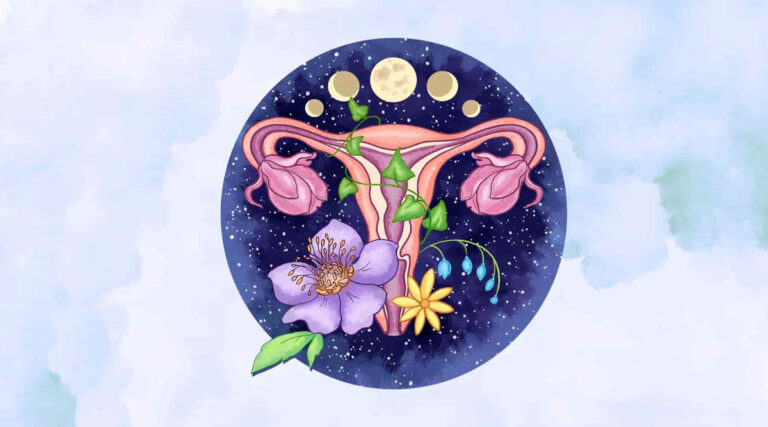Most menstruators agree that we feel like a different person every week. The rapid shift in our hormones can leave us feeling like a ball of energy, confident and motivated, and the following week can leave us in an uncontrolled state of insecurity, sluggishness and irritability. Despite trying to fight our hormones, all we can do is master them and work with them. Learning the phases of our cycle and what they mean is the best way to understand our complicated and beautiful bodies and to work with our natural energy flow. Our cycles are our strength, not our obstacles!
The phases
Follicular
This phase represents the days between the first day of your period and ovulation. It usually takes 14 days, but this varies per person. Estrogen levels usually begin to balance at this time and your body begins to prepare for ovulation. Most will feel more energetic and sexually driven, increase their self-confidence, and some will experience increased cognitive function and clearer skin.
- Recommendations: Increase activities, exercise, dance and movement. Socialize, meet new people, go on dates and try new things. Eat a healthy diet to prepare and nourish the body for the next phase, especially if you are trying to conceive. Fertilization happens more easily in healthy, nutritious and mineral-rich bodies.
Ovulation
This is the phase when fertility is at its peak. Ovulation occurs when an ovary releases a mature egg and waits 24 to 48 hours for fertilization by a sperm. At this time, our internal body temperature rises, our pheromones change, and often our mood is positive and our energy is focused outward. The cervical fluid will change at this time and will usually be more watery and clear. This allows the sperm to reach the egg more easily. Some will experience mild pelvic cramps or discomfort and bloating.
- Recommendations: This is a good time to be social, creative and active, taking action on goals, starting new routines and planting seeds for the future. Most will feel more energetic at this time with an increased libido. If you are trying to get pregnant, now is the best and most optimal time to get started! Fertility Prep Conception Support can be used in all phases to further support fertility during the ovulation phase. If you are not trying to get pregnant, this is when birth control methods are most important.
Luteal
When ovulation occurs, the luteal phase begins and ends when your next period begins. It also takes about 14 days. If the egg was fertilized during the ovulation phase, this phase will increase progesterone levels in the body and help maintain the thickness of the uterine lining to support the fetus. If the egg is not fertilized, progesterone levels drop and your body prepares for menstruation. This stage can cause some to experience breast tenderness, bloating, fatigue, changes in appetite, cramps, increased physical and emotional sensitivity, moodiness and anxiety.
- Recommendations: Supportive herbs such as PMS Emotional Mood Support (if not pregnant), Magnesium to help calm the nervous system and support sleep. Solitude and gentleness are important at this time. Allow yourself to express your opinions and your needs to loved ones and give yourself the grace to let your emotions flow through you so you can release them.
Period
The shedding of the uterine lining after the ovulation phase takes place when the egg is not fertilized. Estrogen levels tend to be higher at this time. It is important to observe the color of your menstrual blood, as brown/old looking blood can indicate a sluggish hormonal system and a lack of thorough uterine discharge. Menstruation usually lasts 5-7 days. Some may feel tired, discomfort throughout the body, severe menstrual cramps, loss of energy and emotional complaints.
- Recommendations: Cramp Release Menses Soother to relieve menstrual symptoms, giving you permission to rest and eat without guilt. Internal reflection, warm baths, setting goals or intentions for your daily routines, plenty of water and vitamin C to support thorough lining loss. Mineral and iron-rich foods are important to support mood and energy. Hormone balancing herbs such as Cycle Harmony Hormone Support can be taken throughout the cycle to make the menstrual week easier and more manageable.
By embracing the rhythms and fluctuations of our hormonal systems, we empower ourselves to cultivate self-care, understanding, and compassion for our bodies and those around us. Keep in mind that everyone’s experience with their cycle is unique. When determining the best cycle support regimen for you, it is best to consult a doctor as they are qualified to guide you in a way that supports your individual needs and health history.
Rebecca Younger is passionate about herbs and women’s health. She strives to plant seeds of inspiration within her community about plant medicine and healthier ways of living. She studied herbal medicine at Herbalism Roots in Denver and is a certified Doula through the Matrona Foundation. She is the customer journey leader at WishGarden Herbs.
For educational purposes only. This information has not been evaluated by the Food and Drug Administration. This information is not intended to diagnose, treat, cure, or prevent any disease, or to sell any product.
Read further

